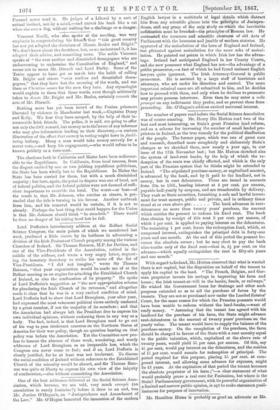One of the best addresses delivered at the Social Science
Asso- ciation, which became, we are told, very much ennuyie (an association is surely feminine?) before it drew to an end, was Mr. Justice O'llagan's, on "Jurisprudence and Amendment of the Law." Mr. O'Hagan lamented the immersion of the modern English lawyer in a multitude of legal details which distract him from any scientific glance into the principles of Jurispru- dence, and any grasp of the only study on which the inevitable codification must be founded—the principles of Roman law. He contrasted the terseness and scientific clearness of old Acts of Parliament with the looseness and jumble of modern statutes. He approved of the assimilation of the laws of England and Ireland, but pfotested against assimilation for the mere sake of assimi- lation. He pointed out points in which Irish law has the advan- tage. Ireland had anticipated England in her County Courts, and she now possesses what England has not—the advantage of a public prosecutor, —a fact of which he had feund eminent English lawyers quite ignorant. The Irish Attorney-General is public prosecutor. He is assisted by a large staff of barristers and attorneys, who act under his direction and control. The more important criminal cases are all submitted to him, and he decides how to proceed with them, and only when he declines to prosecute may private persons intervene. Even then he may enter a no/le prose qui on any indictment they prefer, and so prevent them from proceeding. Mr. O'Hagan's address excited universal interest.






























 Previous page
Previous page